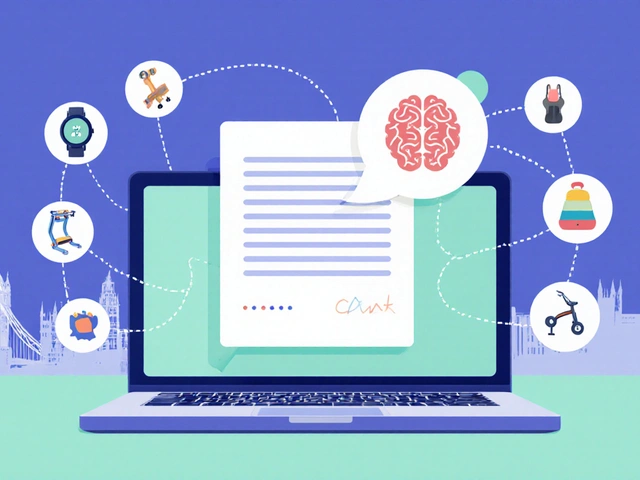In the dynamic world of SEO, keeping up with the latest tools and strategies is crucial. ChatGPT stands out as a remarkable AI tool that can significantly boost your search engine optimization efforts. If you're looking to create impactful, engaging content that resonates with your audience, integrating ChatGPT into your strategy may be a game-changer.
This guide will break down practical ways to make ChatGPT work for you. From selecting the right keywords to crafting narratives that captivate readers, we'll delve into how you can leverage this AI tool to elevate your brand's online presence. Explore the revolutionary potential of combining artificial intelligence with SEO techniques to stay ahead in the digital landscape.
- Understanding ChatGPT’s Role
- Optimizing with AI
- Creating Compelling Content
- Improving User Engagement
- Future Trends in AI and SEO
Understanding ChatGPT’s Role
Imagine a world where content creation is not only efficient but also tailor-made to catch the eye of search engines. This is where ChatGPT steps in. At its core, ChatGPT is a powerful language model designed to generate human-like text. It's trained on diverse datasets, allowing it to understand and produce coherent content on a wide range of topics. When applied to SEO, ChatGPT's capabilities can significantly impact the way we craft digital narratives, propelling content to higher visibility on the web.
Beyond merely generating text, ChatGPT facilitates personalized content creation, adapting its output to the specific needs of a business. This level of customization means your brand's voice can shine through, establishing a stronger connection with your audience. By leveraging ChatGPT, companies are able to produce high-volume, quality content without the extensive time investment that traditional methods might demand. This becomes a pivotal strategy in an age where content is king, and time is often a scarce commodity.
The Technical Edge of ChatGPT
ChatGPT also offers significant advantages from a technical perspective. It's equipped to tackle keyword optimization, an integral aspect of SEO. By naturally incorporating keywords into fluent and engaging text, ChatGPT aids in improving search engine rankings without resorting to clumsy keyword stuffing. Moreover, the tool is capable of understanding semantic relationships, enhancing its ability to cater to search intent. This nuanced understanding helps in crafting answers to precisely what users are searching for, rather than just what they type.As more businesses tap into digital platforms, the competition for attention intensifies. A well-crafted SEO strategy that incorporates ChatGPT can provide a competitive edge. An article published in the Journal of Digital Marketing highlighted,
"Integrating AI, like ChatGPT, into content strategies can increase a brand's reach and engagement by up to 40% when executed effectively."Such statistics underscore the importance of understanding and utilizing AI in SEO efforts, making it clear why forward-thinking marketers are quick to embrace these tools.
As we look ahead, the synergy between AI and SEO is expected to grow even stronger. SEO trends are shifting rapidly, with AI tools like ChatGPT at the forefront of these changes. Staying informed and adaptive to these innovations will not only enhance digital presence but also set the stage for long-term success in digital marketing. Through skilled use of ChatGPT, brands can ensure their content is not only seen but also remembered and valued by their audience.
Optimizing with AI
In today’s digital age, businesses need to keep pace with rapid technological advancements. Leveraging AI tools for optimizing content has gained significant traction, and ChatGPT is at the forefront of this evolution. By harnessing the capabilities of artificial intelligence, companies can enhance their content creation processes, ensuring that the material produced is both engaging and optimized for search engines. It’s not just about producing content; it’s about creating the right content that aligns with both algorithmic preferences and user intent. Through AI optimization, even the most subtle nuances in language can be tailored to what readers truly seek.
One critical aspect of optimizing with AI, particularly with ChatGPT, is its ability to analyze large datasets to generate relevant keyword suggestions. These not only help in driving more traffic but also in aligning with users’ search patterns. ChatGPT can assist marketers in identifying trending topics, thus allowing them to craft content that is both timely and relevant. Moreover, the tool’s predictive text and smart suggestions provide a roadmap for content structure that enhances readability and engagement. Whether you’re focusing on long-tail keywords or industry-specific terminology, ChatGPT’s precision in this area is a game-changer.
"AI is not to displace creativity; it is to augment it." – MIT Technology Review
An often overlooked feature of AI optimization is the personalization of content. By analyzing user behavior and preferences, ChatGPT can aid in crafting content that speaks to the individual’s needs rather than a generalized audience. This personalized content strategy can lead to improved user interaction and higher retention rates. Most importantly, AI-driven content allows marketers to conduct A/B testing effectively. With data-driven insights, they can refine their content approach to optimize for various parameters such as engagement, click-through rates, and conversion rates. AI tools like ChatGPT are increasingly becoming invaluable for creating personalized experiences across all digital platforms.
Imagine you’re running a campaign for a new digital product. With the help of AI, specifically through ChatGPT, you could fine-tune your product’s descriptions and promotional materials in endless narratives. You could generate FAQs based on potential customer queries, optimizing them for common search terms. Additionally, you could get insights into competitors by scraping the web for similar products and understanding how they market themselves. All these elements together allow for a refined digital marketing strategy that doesn’t just meet but anticipates the needs of the audience.
The impact of AI on SEO doesn’t stop at creation. It's integral in the analysis and reporting phase, too. With AI capabilities, businesses can continuously fine-tune their content strategies based on real-time data. This dynamic approach enables marketers to stay relevant amidst constantly changing digital landscapes. AI-driven analytics can provide insights into what works and what doesn’t, ensuring that your SEO strategy remains effective and resilient. Implementing these insights can lead to significant improvements in rankings and visibility, which are crucial for maintaining a competitive edge in the digital realm.
To further illustrate the advantages of using AI for SEO, consider common metrics like user engagement and retention rates. Engaging content, optimized with precision using AI tools like ChatGPT, directly translates to better metrics. Businesses have reported substantial increases in these areas, providing a solid justification for the integration of AI-driven solutions in marketing strategies. As businesses aim for higher visibility and better engagement, the mindful use of AI for optimization will undoubtedly be a cornerstone of successful digital marketing initiatives.

Creating Compelling Content
Crafting content that resonates with your audience is a mix of art and strategy, especially when using AI tools like ChatGPT. This AI powerhouse is like having a creative partner who never sleeps, continuously generating fresh ideas. When you look at the vast amount of information bombarding users online, it's clear why content must stand out. With ChatGPT, you can weave stories that capture attention, driving both clicks and conversations. The AI can help build content not just rich in keywords, but also in narrative quality, ensuring people linger longer on your pages.
One technique that works wonders is using ChatGPT to brainstorm new angles on popular topics. Let's face it, readers get tired of seeing the same headlines and concepts, only slightly repackaged. ChatGPT can generate unique viewpoints by combining relevant data and insights that you might not initially consider. This AI ability to think laterally opens up creative pathways that help your content sing. For instance, a fresh take on a trending topic can be the hook that reels in curious minds, intrigued by a novel perspective.
The Personal Touch with AI
Using AI doesn't mean your content will lack a personal touch. On the contrary, ChatGPT can assist you in recreating the personal and authentic tone that readers appreciate. By analyzing previous content that performed well, you can guide the AI to mimic stylistic elements, ensuring your articles continue to feel human and relatable. Imagine you want to keep a conversational tone that one of your popular blog posts had; ChatGPT can help you replicate that warmth seamlessly.
Moreover, incorporating SEO involves more than sprinkling keywords sporadically across your piece. Instead, these terms need to be embedded naturally within a narrative that holds value and relevance. ChatGPT excels here, weaving keywords into stories like threads in a tapestry, making sure they align with your topic and bring coherence rather than distraction. As one expert aptly puts it, "Content isn't king, it's the kingdom," a sentiment echoing the importance of well-crafted material.
For those willing to experiment, consider creating interactive content elements using the AI's suggestions. Surveys, quizzes, or even a set of provocative questions within your articles can engage users beyond simple reading. Stemming from ChatGPT's varied output, these elements can foster a deeper connection by inviting participation.
Impact of Compelling Stories
Let’s look at some data-driven insights. Articles with engaging stories and emotional connections are more likely to be shared, which amplifies your reach exponentially. Consider the fact that posts with a compelling narrative see up to a 40% increase in social shares. Such impacts reiterate how important it is to integrate storytelling into your SEO strategy. Leveraging ChatGPT's ability to spin tales can enhance not just engagement, but organic growth, bringing more eyes and hearts to your content.
In short, embracing ChatGPT for creating compelling content means you're not just meeting reader expectations; you're elevating them. The interplay of creativity and data is your blueprint for growth, making sure every word counts and every story lands just right.
Improving User Engagement
Driving traffic to a website is only part of the puzzle in digital marketing. For businesses aiming to expand their online footprint, keeping users engaged once they arrive is equally crucial. Leveraging ChatGPT reshapes the way businesses approach content creation, which is central to boosting user engagement. The AI's capacity to generate personalized, context-aware responses provides an opportunity to foster deeper interactions between brands and their audiences. By integrating ChatGPT into a website’s interface, businesses can enhance the user experience by mimicking conversational nuances that mirror real human interactions.
One compelling way that ChatGPT enhances engagement is through the creation of interactive and dialogue-based content. For instance, consider a brand employing ChatGPT to simulate a virtual assistant. This AI-driven assistant can provide immediate, accurate answers to user queries, enhancing the customer service experience without requiring excessive resources. Users tend to stay longer on websites where their problems are addressed swiftly, which in turn reduces bounce rates. Interactive elements are crucial in keeping the digital audience's attention and can remarkably increase the average time a visitor spends exploring a site.
An interesting aspect to note is the personalization aspect that ChatGPT brings into play. This AI tool can tailor responses based on user interaction, which contributes to creating a tailored experience for each user. In fact, McKinsey reports that personalization can deliver up to eight times the ROI on marketing spend and increase sales by at least 10%. By catering to individual user preferences and interests, businesses make users feel valued and understood, encouraging repeat visits and fostering brand loyalty.
According to Neil Patel, a respected figure in digital marketing, “Engagement is not just about keeping users on your site longer; it's about creating deeper connections that lead to conversions.”
Moreover, ChatGPT facilitates the diversification of content formats. Businesses can use it to generate everything from engaging blog posts to informative FAQs and interactive quizzes, all essential for catering to the varied preferences of their audience. This variety ensures that content meets users at their points of interest, which not only increases engagement but also significantly improves the site's performance in search engine rankings. By continuously adapting and offering fresh, valuable content, businesses can develop a loyal audience base that regularly interacts with their brand.
The synergy of AI with traditional SEO strategies holds remarkable promise for significantly enhancing online user engagement. As businesses adapt to these innovative methods, the integration of tools like ChatGPT into their strategy becomes not just beneficial but essential. This AI's user-centered, responsive approach can transform standard passive browsing sessions into meaningful and engaging experiences that capture users' interest and sustain their attention over time.

Future Trends in AI and SEO
The landscape of SEO is constantly evolving, and with the integration of AI, changes are coming faster than ever. As AI technology like ChatGPT becomes more sophisticated, it is transforming how businesses approach digital marketing. One major trend is the hyper-personalization of content; AI's ability to analyze vast datasets enables marketers to tailor content to meet the specific demands of individual users. This technology can discern subtle shifts in consumer behavior and preferences, allowing brands to offer more personalized and relevant user experiences.
Another trend is the shift towards a more conversational approach in search engines, prompted by the rise of voice search. With more people using voice-activated devices, AI can help optimize content for natural language queries, which often differ from typed searches. This means businesses must focus on capturing conversational common phrases and questions users might employ when speaking. The game is changing from keyword-stuffing to genuine dialogue and engagement with the audience.
Moreover, AI's capabilities in visual searches are becoming more significant. Through image recognition algorithms, AI can match user-uploaded photos with relevant content, bringing new dimensions to SEO strategies. This means that brands will need to optimize not just text, but images and videos to excel amidst the growing importance of visual content in search engine results.
Leveraging Predictive Analytics
AI tools like ChatGPT are making predictive analytics more attainable for businesses of all sizes. By analyzing past user behavior and trends, AI can predict future actions, offering insights into potential content needs or product optimization. Imagine being able to anticipate your audience’s next move or understanding what kind of content they might find engaging tomorrow. Companies that harness this data can stay steps ahead, crafting strategies based on reliable predictions rather than hypotheses.
"In an ever-changing digital world, the ability to predict trends even six months ahead can make the difference between leading or lagging," shares an industry expert from a leading marketing analytics firm.
Lastly, the integration of AI with SEO is expected to impact how we measure success. Traditional metrics like page views may become less significant than qualitative measures, such as the level of user engagement or the depth of interaction. AI can provide nuanced insights into these interactions, offering a richer understanding of your strategy’s effectiveness. As we embrace these technologies, businesses must be agile, adjusting to new performance measures that will better reflect actual user satisfaction and retention.





